
ANNALS OF CLINICAL BIOCHEMISTRY
Scope & Guideline
Pioneering Insights for Clinical Excellence.
Introduction
Aims and Scopes
- Clinical Laboratory Diagnostics:
The journal extensively covers the development and validation of diagnostic assays and methodologies, emphasizing the importance of accurate laboratory testing in clinical settings. - Biochemical Markers and Disease Associations:
Research on various biochemical markers, their roles in disease diagnosis and management, and their implications in different patient populations is a core focus. - Quality Assurance and Improvement:
Publications often address quality control, analytical performance, and the standardization of laboratory practices to enhance diagnostic accuracy and patient safety. - Emerging Technologies in Biochemistry:
The journal explores the integration of new technologies, such as machine learning and point-of-care testing, into clinical biochemistry, highlighting innovations that improve diagnostic capabilities. - Public Health and Epidemiology:
Studies examining the biochemical aspects of public health, including the impact of environmental factors and disease prevalence in populations, are frequently featured. - Ethics and Laboratory Management:
The journal addresses ethical considerations and management practices in clinical laboratories, particularly in the context of evolving patient demographics and treatment protocols.
Trending and Emerging
- Integration of Artificial Intelligence:
Research exploring the use of artificial intelligence and machine learning in clinical biochemistry for improving diagnostics and laboratory efficiency is on the rise, showcasing the potential for enhanced data analysis and decision support. - Point-of-Care Testing Innovations:
The development and validation of point-of-care testing devices are increasingly prominent, reflecting the demand for rapid and accessible diagnostic tools in various healthcare settings. - Biomarker Discovery for Chronic Diseases:
There is a growing emphasis on discovering and validating biomarkers for chronic diseases such as diabetes, cardiovascular diseases, and cancer, which is critical for early detection and personalized treatment. - Impact of Environmental Factors on Health:
Research examining the biochemical impacts of environmental factors, such as climate change and pollution, on health outcomes is gaining traction, indicating a broader perspective on public health. - Patient-Centric Laboratory Practices:
The focus on patient experience and the implementation of strategies to enhance patient-centered laboratory practices is emerging as a significant theme, aiming to improve the overall quality of care. - Quality Improvement Initiatives:
Publications related to quality improvement initiatives in laboratory settings are increasingly common, emphasizing the need for continuous enhancement of laboratory processes and patient safety.
Declining or Waning
- Traditional Biochemical Assays:
The reliance on traditional biochemical assays has decreased as more advanced technologies, such as high-throughput screening and molecular diagnostics, gain prominence. - Static Reference Intervals:
The publication of studies that establish static reference intervals for biochemical markers has become less common, as there is a growing emphasis on personalized medicine and dynamic reference values. - Basic Research on Biochemical Pathways:
There has been a noticeable decline in basic research articles focused solely on biochemical pathways without direct clinical application or relevance to laboratory diagnostics. - General Case Reports:
The journal has shifted towards more complex and novel case reports that contribute significantly to clinical practice, resulting in fewer publications of general case reports that do not offer new insights. - Single-Center Studies:
There is a trend away from single-center studies, with a preference for multicenter collaborations that provide broader and more generalizable data.
Similar Journals
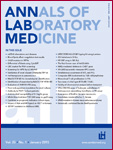
Annals of Laboratory Medicine
Connecting Experts for Enhanced Laboratory SolutionsAnnals of Laboratory Medicine, published by the KOREAN SOC LABORATORY MEDICINE, stands as a pivotal resource for researchers and practitioners in the fields of clinical and medical biochemistry. With a strong Q2 ranking in both Biochemistry (medical) and Clinical Biochemistry, along with a prestigious Q1 status in miscellaneous Medicine categories, this journal emphasizes the significance of laboratory medicine in improving patient outcomes and advancing scientific understanding. Established in 2012, the journal has demonstrated an impressive trajectory of growth and scholarly contribution, making it a reliable source of high-quality research and insightful reviews. The journal utilizes open access, enhancing the reach of its findings across the global scientific community. Operating from South Korea, Annals of Laboratory Medicine aims to foster dialogue and collaboration among professionals, contributing to the continuous advancement of laboratory methodologies and diagnostics.
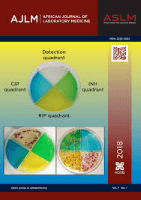
African Journal of Laboratory Medicine
Advancing laboratory medicine for a healthier Africa.The African Journal of Laboratory Medicine, ISSN 2225-2002, e-ISSN 2225-2010, is a premier publication dedicated to advancing the field of laboratory medicine within the African context. Published by AOSIS since 2012, this Open Access journal aims to disseminate influential research findings, clinical studies, and innovative techniques in the realms of Clinical Biochemistry, Medical Laboratory Technology, and Public Health. Based in South Africa, the journal not only serves as a critical platform for sharing knowledge and best practices but also plays a significant role in fostering public health discussions relevant to the continent. Over the years, it has established itself with impactful rankings in various categories, including a Q4 in Clinical Biochemistry and Q3 in both Medical Laboratory Technology and Public Health. As such, it caters to a diverse audience of researchers, professionals, and students eager to stay at the forefront of laboratory medicine research and its applications. The journal’s commitment to quality and accessibility positions it as an essential resource for those looking to make a significant impact in their respective fields.

Journal of Laboratory Physicians
Bridging research and practice in the realm of laboratory medicine.The Journal of Laboratory Physicians is a prestigious, peer-reviewed publication dedicated to advancing the field of laboratory medicine. Published by THIEME MEDICAL PUBL INC, this journal has established itself as a vital source of research and clinical insights since its inception, transitioning to Open Access in 2009 to broaden its reach and accessibility. With an ISSN of 0974-2727 and an E-ISSN of 0974-7826, it aims to provide a platform for professionals, researchers, and students engaged in laboratory-based studies to share critical findings and foster collaboration across disciplines. The journal's scope encompasses a wide range of topics relevant to laboratory physicians, ensuring that it remains an essential resource for those seeking to stay on the cutting edge of laboratory practices and innovations. By disseminating timely research and reviews, the Journal of Laboratory Physicians plays a crucial role in enhancing the quality of healthcare through improved laboratory services.

Advances in Laboratory Medicine-Avances en Medicina de Laboratorio
Elevating Standards in Laboratory Medicine.Advances in Laboratory Medicine - Avances en Medicina de Laboratorio is a distinguished open-access journal published by Walter de Gruyter GmbH, dedicated to the field of medical laboratory technology and the broader aspects of laboratory medicine. Launched in 2020, this journal aims to disseminate high-quality research, innovative methodologies, and critical reviews that foster advancements in laboratory practices. With significant rankings, including Q3 in Medical Laboratory Technology and Q4 in Education and Medicine (miscellaneous) as of 2023, it serves as a vital resource for researchers, professionals, and students interested in enhancing their understanding and implementation of laboratory protocols. Based in Germany, the journal not only emphasizes accessibility through its open-access model but also contributes significantly to the evolving landscape of medical laboratory science. Join a community of scholars striving to improve patient outcomes and elevate standards within the laboratory domain.

Biochemia Medica
Exploring the Intersections of Biochemistry and MedicineBiochemia Medica is a premier open-access journal that has been at the forefront of advancing knowledge in the fields of medical biochemistry and laboratory medicine since its inception in 2006. Published by the Croatian Society of Medical Biochemistry & Laboratory Medicine, this journal serves a vital role in disseminating high-quality research findings and reviews that contribute to the understanding of biochemical processes in health and disease. With an impressive performance in the Scopus ranking, it holds a Q2 quartile category in both medical biochemistry and clinical biochemistry for 2023, reflecting its commitment to scholarly excellence and relevance in the field. As an open-access journal, Biochemia Medica ensures that research is freely accessible, fostering collaboration and innovation among researchers, healthcare professionals, and students globally. Positioned within a rapidly evolving scientific landscape, this journal is dedicated to bridging the gap between laboratory research and clinical application, making it an indispensable resource for anyone interested in the intersections of biochemistry and medicine.
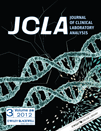
JOURNAL OF CLINICAL LABORATORY ANALYSIS
Transforming research into real-world laboratory solutions.JOURNAL OF CLINICAL LABORATORY ANALYSIS is a premier, peer-reviewed journal published by WILEY, focusing on the expansive field of laboratory medicine. With its ISSN 0887-8013 and E-ISSN 1098-2825, this open access journal has been serving the scientific community since 1987. As of 2023, it holds a notable impact in various domains, achieving category quartiles in Biochemistry, Clinical Biochemistry, Hematology, and more, showcasing its significance across multiple disciplines such as Medical Laboratory Technology and Public Health. Ranked impressively, it is placed 7th in Medical Laboratory Technology, reflecting its crucial role in advancing clinical practice and research. The journal aims to disseminate innovative research findings, methodologies, and reviews that can catalyze advancements in laboratory practices and improve patient outcomes. Accessible to a global audience since its transition to open access in 2019, the journal is not just limited to professionals but is also a valuable resource for students and researchers seeking to stay updated in this dynamic field. For more information, visit the journal's website.

CARIES RESEARCH
Advancing dental science for a healthier smile.Caries Research is a leading academic journal dedicated to advancing the field of dentistry, specifically focusing on the study and prevention of dental caries. Published by KARGER in Switzerland, this esteemed journal has been a cornerstone of research since its inception in 1967 and will continue to disseminate critical findings through to 2024. With an impressive impact factor, it is ranked in the top quartile (Q1) of dentistry journals, specifically at rank #14 out of 132 in the General Dentistry category, reflecting its significant contribution and high visibility within the academic community. Although it does not currently offer open access, the journal is essential for dental researchers, practitioners, and students seeking the latest insights into caries prevention, diagnosis, and treatment methodologies. The journal's comprehensive scope encompasses clinical studies, laboratory research, and reviews, making it an invaluable resource for those devoted to improving oral health outcomes. For more information, please consult the publisher's website at KARGER in Basel, Switzerland.

Clinical Pathology
Connecting Researchers to the Future of Pathological ScienceClinical Pathology, an esteemed journal published by SAGE Publications Ltd, stands at the forefront of advancing knowledge in the intersection of histology, microbiology, and pathology. As an Open Access journal since 2019, it provides researchers and healthcare professionals seamless access to high-quality, peer-reviewed articles that contribute to the field's growing body of knowledge. With a focus on enhancing diagnostic methodologies and advancing clinical applications, Clinical Pathology serves a diverse audience eager to explore innovative research and practical insights. The journal currently holds Q3 status in Histology and Pathology and Forensic Medicine, and Q4 in Medical Microbiology, reflecting its commitment to rigorous scholarship within a competitive landscape. Its ranking in Scopus further positions it as a vital resource for professionals striving for excellence in clinical and experimental pathology. We invite researchers, students, and professionals to engage with the latest findings and share their valuable contributions to help propel the field forward.
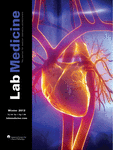
AMERICAN JOURNAL OF CLINICAL PATHOLOGY
Empowering Research in Pathology and MedicineThe American Journal of Clinical Pathology, published by Oxford University Press Inc, stands as a vital resource in the fields of pathology and clinical medicine. With a rich history dating back to 1945 and an impressive impact factor reflected in its Q1 ranking in Pathology and Forensic Medicine, this journal serves as a cornerstone for researchers and professionals seeking to advance their knowledge and practice. Covering a breadth of topics within the discipline, it is recognized in 2023 as ranked #24 out of 208 in its category, highlighting its esteemed reputation within the scientific community. Although the journal does not currently offer open access, its rigorous peer-reviewed articles and cutting-edge research make it an essential addition to any academic or clinical library. The ISSN for print version is 0002-9173, with an E-ISSN of 1943-7722 available for digital access. Researchers, students, and practitioners alike will benefit from its comprehensive scope and commitment to disseminating high-quality scientific inquiry.
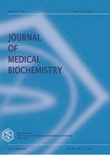
Journal of Medical Biochemistry
Advancing the Frontiers of Medical BiochemistryJournal of Medical Biochemistry is a distinguished peer-reviewed journal published by the SOC MEDICAL BIOCHEMISTS SERBIA, focusing on the significant intersection of biochemistry and medicine. With an e-ISSN of 1452-8266, this Open Access journal has been enriching the academic community since 2007, providing vital insights and research findings that advance the field of medical biochemistry. Based in Belgrade, Serbia, the journal plays a pivotal role in disseminating contemporary research, highlighted by its impressive standings in the 2023 quartile rankings, featuring Q2 in Medical Biochemistry and Q3 in Clinical Biochemistry. The journal is recognized in Scopus with rankings that position it within the discerning area of medical biochemistry and clinical biochemistry, attesting to its influence and relevance. By promoting innovative research and facilitating an open exchange of scientific ideas, the Journal of Medical Biochemistry is a crucial resource for researchers, professionals, and students dedicated to uncovering the biochemical underpinnings essential to improving human health.